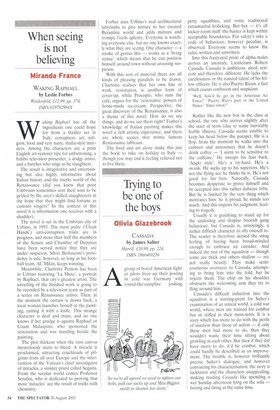When seeing is not believing
Miranda France
WAKING RAPHAEL by Leslie Forbes Weidenfeld, £12,99, pp. 374, ISBN 029782984X Ivaking Raphael has all the ingredients one could hope for from a thriller set in Italy: corruption, art, religion, food and very nasty, mafia-style murders. Among the characters are a prim English art-restorer ripe for unbuttoning, a bimbo television presenter, a dodgy aristo, and a butcher who sings as he slaughters.
The result is imaginative and entertaining but also highly informative about Italian history and the murky world of the Renaissance (did you know that poor Umbrians sometimes sent their sons to be gelded by the area's skilled slaughterers in the hope that they might find fortune as castrato singers? In the context of this novel it is information one receives with a shudder).
The novel is set in the Umbrian city of Urbino, in 1993. The mani pulite (`Clean Hands') anti-corruption trials are in progress, and more than half the members of the Senate and Chamber of Deputies have been served notice that they are under suspicion. Silvio Berlusconi's presidency is safe, however, so long as his football team, AC Milan, keeps winning.
Meanwhile, Charlotte Penton has been in Urbino restoring *La Mina'. a portrait by Raphael, that city's greatest artist. The unveiling of the finished work is going to be recorded by a television team as part of a series on Renaissance artists. Then, at the moment the curtain is drawn back, a local woman launches herself at the painting, cutting it with a knife. This strange character is deaf and mute, and no one knows if her grudge is against Raphael or Count Malaspino, who sponsored the restoration and was standing beside the painting.
The plot thickens when the torn canvas mysteriously starts to bleed. A miracle is proclaimed, attracting coachloads of pilgrims from all over Europe and the intervention of the Vatican's chief investigator of miracles, a sinister priest called Seguita. From the secular world comes Professor Serafini, who is dedicated to proving that most 'miracles' are the result of tricks with chemistry. Forbes uses Urbino's real architectural labyrinths to give texture to her created Byzantine world and adds mirrors and trompe l'oeils aplenty. Everyone is watching everyone else, but no one knows exactly what they are seeing. One character — a stroke of genius this — works as a 'living statue', which means that he can position himself around town without arousing suspicion.
With this sort of material there are all kinds of pleasing parallels to be drawn. Charlotte realises that her own line of work, restoration, is another form of cover-up, while Procopio, who runs the café, argues for the 'restorative' powers of home-made ice-cream. Perspective, the great discovery of the Renaissance, is also a theme of this novel. How do we see things, and do we see them right? Forbes's knowledge of Italian painting makes this novel a rich artistic experience, and there are whole scenes that mimic famous Renaissance tableaux.
The food and art alone make this just the book to take on holiday to Italy — though you may end it feeling relieved not to live there. petty squabbles, and some traditional extramarital frolicking. But hey — it's all locker-room stuff: the banter is kept within acceptable boundaries. For safety's sake a code of behaviour, however peculiar, is observed. Everyone seems to know the rules, written and unwritten.
Into this frustrated pride of alpha males arrives an anomaly, Lieutenant Robert Cassada. Cassada is ambitious, aloof, reticent and therefore different. He lacks the carelessness or the natural talent of his fellow officers. He is also Puerto Rican, a fact which causes confusion and suspicion:
'Well, how'd he get in the American Air Force?' Puerto Rico's part of the United States. Since when?'
Rather like the new boy in the class at school, the one who arrives slightly after the start of term (due to some inevitably feeble illness), Cassada seems unable to keep his head below the parapet. He is a flop, from the moment he walks into the canteen and announces that he doesn't drink coffee — 'I seem to be sensitive to the caffeine.' He sweeps his hair back, 'Anglo style'. He's a try-hard. He's a swank. He sucks up to his superiors. He's not the flying ace he thinks he is. He's not good for his bets. Naturally. Cassada becomes desperate to prove himself and be accepted into this rather dubious tribe. But he is limited by the very thing which motivates him: he is proud, he minds too much. And this impairs his judgment, leading to tragedy.
Usually it is gratifying to stand up for the underdog and despise boorish gang behaviour, but Cassada is, annoyingly, a rather difficult character to ally oneself to. The reader is therefore denied the smug feeling of having been broad-minded enough to embrace an outsider. And indeed the rest of the squadron — though some are thick and others shallow — are not really beastly. They make semicourteous overtures to Cassada, attempting to bring him into the fold, but he rejects them. The chip on his shoulder obstructs the welcoming arm they try to fling around him.
Cassada's difficult induction into the squadron is a starting-point for Salter's examination of an unreal world, a cold war world, where men are trained for combat but sit stifled in their mess-tents. It is a story which has more to do with the perils of inaction than those of action — if only these men had more to do, then they wouldn't waste their time sitting about growling at each other. But then if they did have more to do, it'd be combat, which could hardly be described as an improvement. The trouble is, however brilliantly precise Salter's dialogue, and however convincing his characterisation, the story is lacklustre and the characters unappealing, making reading Cassada like spending a wet Sunday afternoon lying on the sofa — boring and tiring at the same time.


























































 Previous page
Previous page